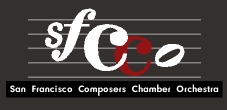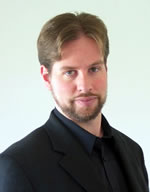SAN FRANCISCO COMPOSERS CHAMBER ORCHESTRA
Presents "In Case of Emergency, Press M for Music"
Saturday, May 13, 2023 at 8 pm
Lakeside Presbyterian Church
201 Eucalyptus Drive, San Francisco, CA
Scott Sterling is a freelance trombonist in the Bay Area and makes his home in Berkeley. He earned his Bachelor's in Music Education at California State University East Bay in 2010. Sterling is the bass trombonist in the Kensington Symphony Orchestra. As a composer, he is a frequent contributor to The Opus Project. In February, 2013, for The Opus Project presents Opus 13, he wrote Musical Portraits in Phrasing; a compilation of 13 eight-bar harmonized Introductory Melodious Etudes set as a walk through an Art Gallery. The Promenade is the same for both works. Sterling is currently writing a book and developing an online course about teaching Sight Reading, entitled Page to Performance.
|
Hussein Al-Nasrawi is an accomplished pianist who graduated from San Francisco State University (B.M., 2018, and M.M., 2020), and was born to Iraqi parents. His passion for music is showcased through improvisation, by playing pieces by various composers, and by composing pieces representing people and places. |
|
|
Scott Sterling is a freelance trombonist in the Bay Area and makes his home in Berkeley. He earned his Bachelor's in Music Education at California State University East Bay in 2010. Sterling is the bass trombonist in the Kensington Symphony Orchestra. As a composer, he is a frequent contributor to The Opus Project. In February, 2013, for The Opus Project presents Opus 13, he wrote Musical Portraits in Phrasing; a compilation of 13 eight-bar harmonized Introductory Melodious Etudes set as a walk through an Art Gallery. The Promenade is the same for both works. Sterling is currently writing a book and developing an online course about teaching Sight Reading, entitled Page to Performance. |
Spencer Park, Bugle |
|
Vance Maverick is a composer in San Francisco. He has worked for many years as a computer programmer, and has also studied composition at university, at the San Francisco Community Music Center, and privately. |
Megan Cullen, Soprano |
|
Justine Leichtling is a composer, violinist, and psychologist. A native San Franciscan, she grew up playing the violin with various Bay Area institutions like the Crowden School, the San Francisco Youth Orchestra, and the SF Conservatory (back when it was in the Sunset). Her passion for composing, however, took off more recently. What emerged as a pandemic craving has become her next professional pursuit, and Justine will be attending Mannes School of Music in New York for a Master's in Composition in the fall. While new in many ways, Justine can trace her drive to create music back to her middle school days as a violin student of Anne Crowden, who remains a life-affirming internal object despite no longer being physically with us. Thus, Justine has dedicated her piece on this program to Anne, her first creative mentor. |
I. Monday Justine Leichtling, Violin |
|
Stardust is an anarchist, animist, queer/genderqueer, radical faerie composer living in the somewhat embattled and mythical sanctuary of San Francisco. Since 2014, Stardust's SFCCO offerings have included A la recherche des danses perdues, Home, Railway Sonata, Wiggle, and a theatre triptych of True of Voice Overture, True of Voice Entr'acte, and True of Voice Finale. Stardust also playwrights, most recently creating Lucia, a play about a lesbian anarchist revolutionary organizer of a group called "Mujeres Libres" ("Free Women") during the Spanish Civil War and Social Revolution. Other works include chamber music and symphonic music prepared for encouraging musician friends at events such as the Humboldt and Calcap Chamber Music Workshops and welcoming ensembles such as the Opus Project Orchestra, the Golden Gate Symphony, the San Francisco Lesbian & Gay Freedom Band, and of course the San Francisco Composers Chamber Orchestra. Stardust plays the oboe and the English horn. |
Les Fleurs Interdites: Le Léthé (Forbidden Flowers: Lethe) Megan Cullen, Soprano |
|
John Beeman studied with Peter Fricker and William Bergsma at the University of Washington where he received his Master's degree. His first opera, The Great American Dinner Table was produced on National Public Radio. Orchestral works have been performed by the Fremont-Newark Philharmonic, Santa Rosa Symphony, and the Peninsula Symphony. The composer's second opera, Law Offices, premiered in San Francisco in 1996 and was performed again in 1998 on the steps of the San Mateo County Courthouse. Concerto for Electric Guitar and Orchestra was premiered in January 2001 by Paul Dresher, electric guitar. Mr. Beeman has attended the Ernest Bloch Composers' Symposium, the Bard Composer-Conductor program, the Oxford Summer Institutes, and the Oregon Bach Festival and has received awards through Meet the Composer, the American Music Center and ASCAP. Compositions have been performed by Ensemble Sorelle, the Mission Chamber Orchestra, the Ives Quartet, Fireworks Ensemble, the Oregon Repertory Singers and Schola Cantorum of San Francisco. Carla Brooke, Librettist |
Ishi - Robert Vann, Tenor |
|
Dr. Mark Alburger (1957-2023, Upper Darby, PA) was an award-winning, eclectic ASCAP composer with postminimal, postpopular, and postcomedic sensibilities. He was the Music Director of SF Composers Chamber Orchestra, SF Cabaret Opera / Goat Hall Productions, and The Opus Project; Editor-Publisher of 21st-Century Music and New Music; Adjunct Professor Emeritus of Music Theory and Literature at Diablo Valley College; and a Musicologist for Grove Online and Grove Dictionary of American Music. His principal teachers were Gerald Levinson and Joan Panetti (Swarthmore College, B.A.); Jules Langert (Dominican University, M.A.); Christopher Yavelow (Claremont University, Ph.D.); and Terry Riley. Dr. Alburger had composed 399 major works, including chamber music, concertos, oratorios, operas, song cycles, and symphonies. His complete catalogue was available from New Music. (markalburgerworks.blogspot.com) |
Megan Cullen, Soprano |
![]() Click on the links to listen to the music.
Click on the links to listen to the music. ![]() Click on the links for video.
Click on the links for video.
| Piccolo / Flute / Alto Flute
Oboe / English Horn Clarinet Bassoon |
Horn Trumpet / Bugle Trombone Piano Percussion |
Violin I Violin II Viola Cello Bass
|


 John Kendall Bailey is an Associate Conductor with the San Francisco Composers Chamber Orchestra and is Principal Conductor and Chorus Master of the Trinity Lyric Opera, Music Director and Conductor of Voices of Musica Sacra, and Artistic Director of the San Francisco Song Festival. In 1994, Mr. Bailey founded the Berkeley Lyric Opera and served as its Music Director and Conductor until 2001. Since then he has been a guest conductor with the Oakland East Bay Symphony, Oakland Youth Orchestra, and Oakland Ballet, and music director and conductor for productions with North Bay Opera, Mission City Opera, Goat Hall Productions, Solo Opera, the Crowden School and Dominican University. From 2002-2006 he was the Chorus Master of the Festival Opera of Walnut Creek. Mr. Bailey is also a composer, and his works have been performed and commissioned in the Bay Area and abroad.
John Kendall Bailey is an Associate Conductor with the San Francisco Composers Chamber Orchestra and is Principal Conductor and Chorus Master of the Trinity Lyric Opera, Music Director and Conductor of Voices of Musica Sacra, and Artistic Director of the San Francisco Song Festival. In 1994, Mr. Bailey founded the Berkeley Lyric Opera and served as its Music Director and Conductor until 2001. Since then he has been a guest conductor with the Oakland East Bay Symphony, Oakland Youth Orchestra, and Oakland Ballet, and music director and conductor for productions with North Bay Opera, Mission City Opera, Goat Hall Productions, Solo Opera, the Crowden School and Dominican University. From 2002-2006 he was the Chorus Master of the Festival Opera of Walnut Creek. Mr. Bailey is also a composer, and his works have been performed and commissioned in the Bay Area and abroad.